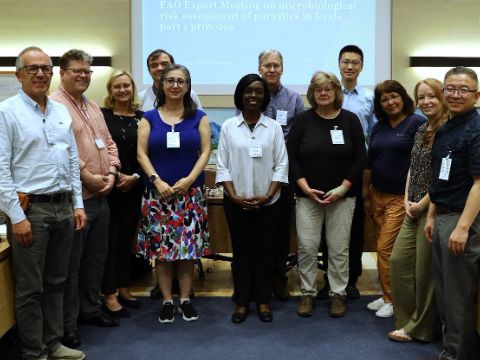- A Charles Sturt University expert is contributing to UN global food safety knowledge, through science-based, collaborative approaches to improving global food systems
- The focus is on vulnerable populations, with the goal to support countries to develop robust food control systems that protect consumers from foodborne parasitic infections
- Foodborne parasites cause approximately 30 per cent of foodborne illnesses worldwide, with more than 5 million case of food poisoning in Australia annually
A leading Charles Sturt University parasitology and food safety expert has contributed to a United Nations (UN) expert panel in Rome to review and update scientific advice on foodborne parasites.
 Professor in Veterinary Parasitology Shokoofeh Shamsi (pictured left) in the Charles Sturt School of Agricultural,
Environmental and Veterinary Sciences was invited to attend the UN Food and Agriculture Organization (FAO) at its headquarters in Rome, Italy, in late May to review and update scientific advice on foodborne parasites.
Professor in Veterinary Parasitology Shokoofeh Shamsi (pictured left) in the Charles Sturt School of Agricultural,
Environmental and Veterinary Sciences was invited to attend the UN Food and Agriculture Organization (FAO) at its headquarters in Rome, Italy, in late May to review and update scientific advice on foodborne parasites.
“Foodborne parasites are responsible for a significant portion - around 30 per cent - of foodborne illnesses globally and the FAO is taking proactive steps to address foodborne parasites,” Professor Shamsi said.
“For example, there are more than 5 million cases of food poisoning in Australia each year, both through businesses and at home.
“This is a huge number for a developed country such as Australia which only has a population of about 27 million, and can be prevented by storing, handling and serving food safely.”
Professor Shamsi said the FAO collaborative global consultation with international experts in food safety and parasitology is a vital step in making sure international food safety standards reflect the latest science.
“The meeting brought together eight global experts to examine the current burden of parasitic disease, evaluate detection methods and propose practical prevention and control strategies,” she said.
“The focus is on vulnerable populations and global equity in food safety solutions with the goal to support countries in developing robust food control systems that protect consumers from foodborne parasitic infections, especially those most at risk.
“This consultation seeks to strengthen global food safety by offering evidence-based strategies for parasite control, particularly in low- and middle-income countries.”
The expert panel’s findings will inform updates to the Codex Alimentarius (or ‘Food Code’), the internationally recognised food standards framework, which supports safer global food systems and helps countries implement practical solutions that reduce illness and improve public confidence in food systems.
“Enhancing Codex Alimentarius standards guidelines ensures better protection of public health, equitable food safety regulation and safer trade in food products,” Professor Shamsi said.
 The meeting focused on protozoal parasites such as Cryptosporidium, Giardia, Cyclospora, Trypanosoma and Toxoplasma, and contributes to future updates of the Codex.
The meeting focused on protozoal parasites such as Cryptosporidium, Giardia, Cyclospora, Trypanosoma and Toxoplasma, and contributes to future updates of the Codex.
Professor Shamsi’s participation in the FAO expert consultation highlights Charles Sturt University’s global leadership in tackling pressing public health issues through science and international collaboration.
She said Charles Sturt University has a strong research reputation in food safety, One Health and parasitology. Participation in the UN FAO forum underscores the University’s capacity and contribution:
- Global impact: showcasing Charles Sturt’s contribution to shaping international food safety policy through the Codex Alimentarius.
- Research excellence: reinforcing the University’s research strength in parasitology, zoonoses, and biosecurity.
- Thought leadership: demonstrating how Charles Sturt experts are trusted voices at high-level UN meetings.
- Public trust: informing the public that Charles Sturt researchers are helping ensure the safety of the global food supply.
Professor Shamsi’s expertise relates to the study of parasitology in the Charles Sturt double-degree Bachelor of Veterinary Biology/Bachelor of Veterinary Science, the Bachelor of Equine Science, the Bachelor of Animal Science and the Bachelor of Veterinary Technology.






Social
Explore the world of social